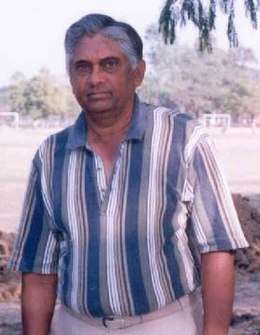Hanumant Singh
Hanumant Singh ![]()
 | ||||||||||||||||||||||||||||||||||||||||
| Personal information | ||||||||||||||||||||||||||||||||||||||||
|---|---|---|---|---|---|---|---|---|---|---|---|---|---|---|---|---|---|---|---|---|---|---|---|---|---|---|---|---|---|---|---|---|---|---|---|---|---|---|---|---|
| Born | March 29, 1939 Banswara, Rajputana, British Raj | |||||||||||||||||||||||||||||||||||||||
| Died | November 29, 2006 (aged 67) Mumbai, Maharashtra, India | |||||||||||||||||||||||||||||||||||||||
| Batting | Right-hand bat | |||||||||||||||||||||||||||||||||||||||
| Bowling | Leg spin | |||||||||||||||||||||||||||||||||||||||
| International information | ||||||||||||||||||||||||||||||||||||||||
| National side |
| |||||||||||||||||||||||||||||||||||||||
| Domestic team information | ||||||||||||||||||||||||||||||||||||||||
| Years | Team | |||||||||||||||||||||||||||||||||||||||
| Madhya Bharat | ||||||||||||||||||||||||||||||||||||||||
| Career statistics | ||||||||||||||||||||||||||||||||||||||||
| ||||||||||||||||||||||||||||||||||||||||
Source: cricinfo, 16 March 2017 | ||||||||||||||||||||||||||||||||||||||||
Personal life
Singh was born in Banswara, Rajputana. He was initially educated at Welham Boys' School in Dehradun.Later he completed his education from Daly College, Indore.He also has a Cricket Ground named after him at Daly College by the name Hanumant Oval.He was a team member of the Madhya Bharat cricket team. He was the second son of Chandraveer Singh, Maharawal of Banswara from 1944 to 1985, making him Maharajkumar of Banswara. His mother was the sister of Kumar Shri Duleepsinhji, making him the grandnephew of Kumar Shri Ranjitsinhji. His older brother, Suryaveer Singh, also played first-class cricket, as did his son, Sangram Singh. A cousin, KS Indrajitsinhji, also played in 4 Tests for India.
Playing career
He played domestic first-class cricket for Madhya Bharat and then Rajasthan and Central Zone, and was known as "Chhotu" as a result of his short stature. He batted well from the back foot, particularly working the ball on the leg side.
He made his Test debut in the 4th Test against England at Delhi in February 1964, scoring 105 and so becoming the fifth Indian to make a Test century on debut, emulating Lala Amarnath, Deepak Shodhan, A. G. Kripal Singh and Abbas Ali Baig. Later that year, he reached 94 in his first Test against Australia, out of a total of 193.
He also played at home against New Zealand in 1964–65 and against West Indies in 1966–67, and toured England in 1967. However, like many other prominent Indian players, he was surprisingly excluded from the 1967–68 tour to Australia. Recalled to play against New Zealand at Bombay in September 1969, he scored 1 and 13, caught behind both times off the fast bowling of Dayle Hadlee, and did not play Test cricket again. He never scored another test century.
He was captain of Rajasthan in three Ranji Trophy finals, but lost each time. He also captained Central Zone to its first victory in the Duleep Trophy in 1971–72. In the Ranji Trophy final in 1966–67, he scored 109 and 213* against Bombay. His older brother, Suryaveer Singh, made 79 and 132 in the same match, and they shared partnerships of 176 and 213. Hanumant Singh retired from first-class cricket in 1979.
Coaching career
He was manager of the Indian team that toured the West Indies in 1983 and was of Rajasthan cricket team as well as head coach of Kenya cricket team in early 1990. He coached them to a 1990 ICC Trophy in Netherlands as they lost in semi-final then in 1994 ICC Trophy where UAE cricket team defeated Kenya in the final. He was also coach of the Kenya team that played in the 1996 Cricket World Cup. They had a major win over West Indies cricket team which was considered one of ODI's biggest upsets.[2]
Administrator
He served as an International Cricket Council match referee in 9 Tests and 54 ODIs from March 1995 to February 2002. He was also chairman of the National Cricket Academy, based in Bangalore, and a coach for Rajasthan. Outside of cricket, he was an executive for State Bank of India.
Death
Hanumant Singh died in Mumbai of lung and kidney failure, after contracting from dengue fever and hepatitis B.
References
- "Royalty on the cricket field". International Cricket Council. Retrieved 18 May 2018.
- "From import to export, the Indian coaching story". Archived from the original on 21 June 2017. Retrieved 24 April 2016.
External links
See also
- Hanumant Singh at ESPNcricinfo
- "Former India batsman Hanumant Singh dies aged 67", Reuters, 29 November 2006
- Hanumant Singh - the tragic Prince of Indian cricket, CricketArchive, 29 November 2006
- Obituary, The Daily Telegraph, 29 November 2006
- Obituary, The Times, 18 December 2006